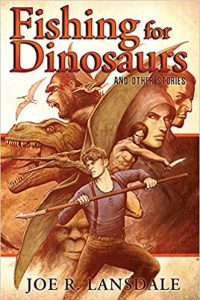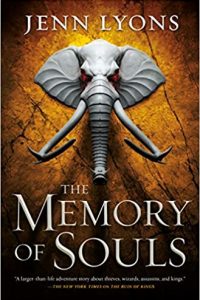Ian Mond Reviews Him by Geoff Ryman
 Him, Geoff Ryman (Angry Robot 978-1-91520-267-3, $18.99, 376pp, tp) December 2023.
Him, Geoff Ryman (Angry Robot 978-1-91520-267-3, $18.99, 376pp, tp) December 2023.
The central conceit of Geoff Ryman’s Him is to imagine an alternative history where Jesus is born biologically female but identifies as male. It’s a provocative premise that seems designed to offend many people of faith. And yet, while gender identity is a crucial aspect of the novel, Him is, in fact, a respectful and somewhat authentic rendition of Jesus’ life told mainly from the perspective of his mother, Maryam (for names and places, Ryman adopts Aramaic, the “common tongue,” rather than Hebrew, Greek, or English). It’s also a novel infused with beauty and compassion that embraces humanity’s flaws and contradictions: our capacity to reject those we love but be forgiven for our failures.
In Revelation, Jesus is cast as the Alpha and Omega, so it’s fitting that Him begins at the end with a distressed Maryam reporting the news that “they’re going to kill him.” We know who “him” is; what we’re not aware of, but will come to discover, is what it took for Maryam to recognise her child’s gender – to view “him” as male. We then skip back three decades where the Kohen Gadol (the High Priest) is dealing with two troublesome individuals: his pregnant niece, Maryam, who claims to be a virgin, her unborn child a miracle from God; and Yosef, who has proclaimed in public the heresy that Adam and Eve were neither man nor woman. Solution: Couple Maryam and Yosef together and exile them to Nazareth.
The story unfolds from there, with Maryam giving birth to a girl whom she names Avigayil. Precocious, playing with the older boys at the age of three, Avigayil is drawn to 15-year-old Yehushua. “She gaped at him as if he were a hero, watched him run, play, or fight.” But when the teenager dies suddenly from a fever, Avigayil tells her mother that her name is now Yehushua.
“That’s a boy’s name, Avigayil” [said Maryam]
“I’m a boy.”
“No, you’re not, Avigayil. You’re a girl. YOU… are more of a girl than anyone who ever lived.” […]
“I’m… a… boy,” Avigayil insisted, her chin thrusting out.
Yosef, weak and ineffectual in Maryam’s eyes, accepts that he now has a son. Maryam does not. Having viewed her daughter as a messenger sent by the Almighty “in the form of a girl, not a king or a conqueror, but a daughter of the highest religious class,” she believes God’s prophet has gone astray. Yet, no matter what Maryam does, Yehushua will not be swayed. Initially a teenage rebel without a cause, his deep understanding of the Torah will see the young man debate with the Sadducai (Sadducee) and Perisayya (Pharisee), leading his ever-growing flock to Yerusalam, where he will preach the word of God. But will Maryam follow?
First and foremost, Him is the story of a mother struggling to come to terms with her child’s gender transition. I loved Ryman’s textured, complex portrayal of Maryam; the way he deftly juggles our sympathy for her – like many parents, she has invested everything into her child – and our disappointment, mainly when Maryam distances herself from her son, referring to him only as the eldest. What comes through, though, is Maryam’s love for all her children (she has seven – more on that below). And given that love, it’s not surprising that, having rejected her son for more than a decade, she comes to acknowledge his gender and his role as the Son of Adam, the embodiment of God’s will (even if she wrestles with the Son’s metaphysical aim of changing God’s mind). The passage where she realises that the Almighty is listening to him, her son, is a moment of great poignancy and love, supplanted only by the beauty and transcendence of the book’s final pages.
Ryman’s compassion for his characters extends to the authenticity he brings to first-century Palestine. When it comes to Jewish culture, he correctly and respectfully identifies the theological and sociological split between the aristocratic and wealthy Sadducee, who accepted only the Torah She’bchtav (the written Law), against the earnest and learned Pharisee, who held by the Torah She’bchtav and the Torah She’baal Peh (the oral Law). All of world Jewry today comes from the latter group. From a theological standpoint, Ryman uses his science fiction toolkit – parthenogenesis and insemination – to have Maryam remain a virgin despite having seven kids. I also adored Ryman’s willingness to unpick and interrogate why the same God who forestalled Abraham from sacrificing his son Isaac would then sacrifice His own son – who, for all the miracles, is still flesh and blood – to suffer on Their behalf. But what resonated deeply was Ryman’s refusal to adopt pernicious and anti-Semitic tropes like the “Wandering Jew” or the notion that Jewish leadership forced the Romans to crucify Christ.
There’s more. I love how reality convulses when the Son of Adam performs a miracle. I love Yosef’s timid but kind nature, acting as a counterpoint to Maryam, and I love the gentle sense of humour that threads through the novel, even during its darkest moments. Him is a remarkable return from Geoff Ryman; I hope we don’t have to wait another decade for his next novel.
Ian Mond loves to talk about books. For eight years he co-hosted a book podcast, The Writer and the Critic, with Kirstyn McDermott. Recently he has revived his blog, The Hysterical Hamster, and is again posting mostly vulgar reviews on an eclectic range of literary and genre novels. You can also follow Ian on Twitter (@Mondyboy) or contact him at mondyboy74@gmail.com.
This review and more like it in the December and January 2023 issue of Locus.
 While you are here, please take a moment to support Locus with a one-time or recurring donation. We rely on reader donations to keep the magazine and site going, and would like to keep the site paywall free, but WE NEED YOUR FINANCIAL SUPPORT to continue quality coverage of the science fiction and fantasy field.
While you are here, please take a moment to support Locus with a one-time or recurring donation. We rely on reader donations to keep the magazine and site going, and would like to keep the site paywall free, but WE NEED YOUR FINANCIAL SUPPORT to continue quality coverage of the science fiction and fantasy field.
©Locus Magazine. Copyrighted material may not be republished without permission of LSFF.






